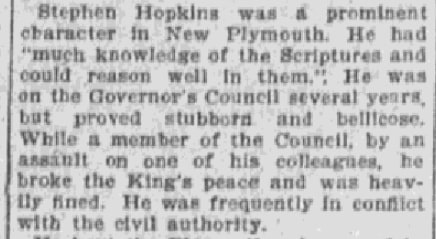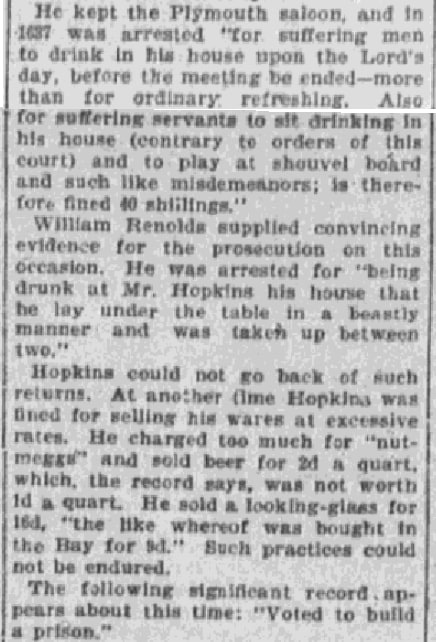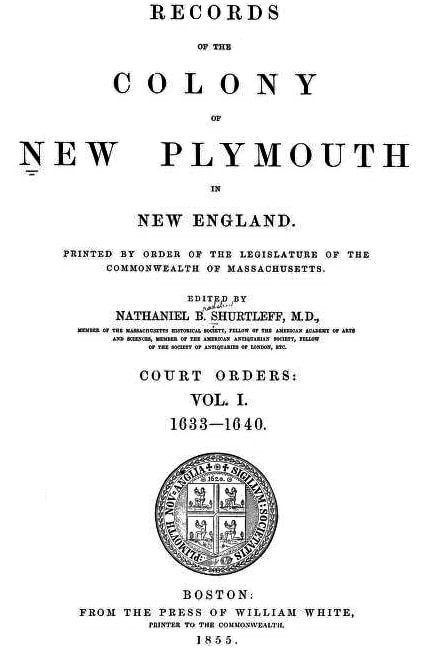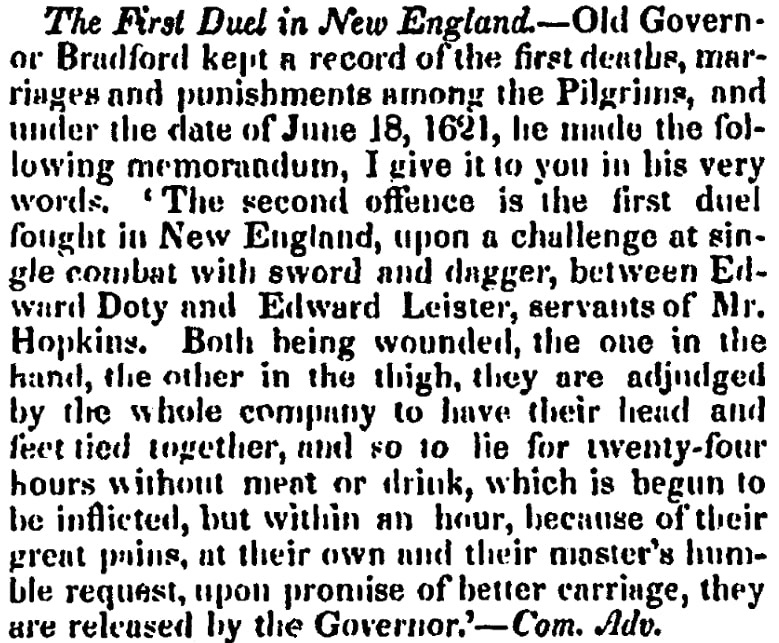Introduction: In this article, Melissa Davenport Berry writes about the trouble that seemed to continually follow Mayflower passenger Stephen Hopkins. Melissa is a genealogist who has a blog, AnceStory Archives, and a Facebook group, New England Family Genealogy and History.
Stephen Hopkins may have made mutinous suggestions while aboard the Mayflower – but that pales in comparison to what occurred after he stepped ashore on Cape Cod. See: ‘Mayflower’ Mutiny & Other Musings on Stephen Hopkins (part 1).

After Hopkins set up his new digs in Plymouth Colony, he eventually was appointed to a position as Assistant to the Governor. His new position did not mean he submitted his will, however, and records show he locked horns with the authorities and others in the colony.
First, he operated a tavern without a license. Then, he pulled a Dionis Coffin, charging more for his beer than the allowable price. He did not stop with high-cost brew – he moved on to gouge customers on bigger wares. He got into a skirmish with a neighbor, and his servants proved to be just as fiery. And one of his maids was far from pious.
The Boston Journal published an article entitled “Rogues of Plymouth. Criminality Had Its Predecessor in the Ranks of the Puritans,” and Hopkins has a feature spot. (Note the misuse of the term Puritans – the first settlers in Plymouth are called Pilgrims.) This long article included this section:

This section reported:
Stephen Hopkins was a prominent character in New Plymouth. He had “much knowledge of the Scriptures and could reason well in them.” He was on the Governor’s Council several years, but proved stubborn and bellicose. While a member of the Council, by an assault on one of his colleagues, he broke the King’s peace and was heavily fined. He was frequently in conflict with the civil authority.
This article had another section about Hopkins:

This section reported additional problems with Hopkins:
He kept the Plymouth saloon, and in 1637 was arrested “for suffering men to drink in his house upon the Lord’s day, before the meeting be ended – more than for ordinary refreshing. Also, for suffering servants to sit drinking in his house (contrary to orders of this court) and to play at shouvel board and such like misdemeanors; is therefore fined 40 shillings.”
William Reynolds supplied convincing evidence for the prosecution on this occasion. He was arrested for “being [so] drunk at Mr. Hopkins’ house that he lay under the table in a beastly manner and was taken up between two.”
Hopkins could not go back of such returns. At another time Hopkins was fined for selling his wares at excessive rates. He charged too much for “nutmeggs” and sold beer for 2d [pence] a quart which, the record says, was not worth 1d a quart. He sold a looking-glass for 16d, “the like whereof was bought in the Bay for 9d.” Such practices could not be endured.
The following significant record appears about this time: “Voted to build a prison.”
Look into the “Records of the Colony of New Plymouth Vol. 1” and there you will find Hopkins’ court dramas.

On 7 June 1636: account of battery was tried between John Tisdale, yeoman, plaintiff, and Stephen Hopkins, assistant to the governor. Hopkins ordered to pay 5 pounds sterling and 40 shillings to plaintiff. Tisdale was badly wounded. (p. 42)
The William Reynolds court hearing of drunkenness witness list: Abraham Warr, alias Hooper, alias Pottle, in the company of Francis Sprague, Samuel Nash, and Georg Partridge. In another mention, Hopkins is presented for suffering excessive drinking in his house, citing Old Palmer, James Coale, William Reynolds, John Winslow, Widow Palmer’s man, Widow Palmer, Thomas Little, and Stephen Tracy. (p. 75)
Hopkins’ servants are noteworthy in the drama, and not just for tippling in the tavern. And his maid was sporting more than “shouvel” board.
The business of Hopkins’ maid servant Dorothy Temple is also reported in the court records. She took up with Arthur Peach, an indentured servant who was first recorded in Virginia in 1635, but made his way to Plymouth.
Temple became with child and daddy Peach dodged responsibility. He made tracks with three others and took off for Rhode Island.
While Peach and his crew were on the road they robbed and murdered an Indian. In 1638 Peach, Thomas Jackson, Richard Stinnings, and Daniel Crosse were indicted for the crimes. All the men were executed except for Crosse, who had escaped. (pp. 96-97)
On 4 June 1639 the court ordered Temple to be whipped twice for “uncleaness and bringing forth a male bastard,” but she fainted from her first lashing so the second was cancelled. (p. 127)
In the meantime, the court ordered Hopkins accountable for Temple and her baby, but he refused to oblige the terms. He solved the issue by working an agreement with John Holmes, who took on Temple’s indenture and her child. (pp. 111, 113)
Hopkins’ two male servants became famous for the first duel fought in America. Rumor has it the two bucks fought over their affections for Constance Hopkins, Stephen’s daughter. The Hampshire Gazette has the skinny.

This article reported:
Old Governor Bradford kept a record of the first deaths, marriages, and punishments among the Pilgrims, and under the date of June 18, 1621, he made the following memorandum. I give it to you in his very words: “The second offense is the first duel fought in New England, upon a challenge at single combat with sword and dagger, between Edward Doty and Edward Leister, servants of Mr. Hopkins. Both being wounded, the one in the hand, the other in the thigh, they are adjudged by the whole company to have their head and feet tied together, and so to lie for twenty-four hours without meat or drink, which is begun to be inflicted, but within an hour, because of their great pains, at their own and their master’s humble request, upon promise of better carriage, they are released by the Governor.”
Trust me peeps there is lots more in the court records and GenealogyBank’s Historical Newspaper Archives!
Explore over 330 years of newspapers and historical records in GenealogyBank. Discover your family story! Start a 7-Day Free Trial
Note on the header image: the home of Mayflower passenger Stephen Hopkins (1581-1644) at Plimoth Plantation, a reconstruction of Plymouth Colony, Plymouth, Massachusetts. Courtesy of World Encyclopedia.
Related Articles:

Stephen Hopkins is my ancestor. There is a lot of information about him.
Thanks Cindy! Indeed there is! I am sure several volumes could be written. Such an interesting fellow!
I’ve just received news, while applying for membership in DAR, regarding my ancestor Aaron Putnam – my 4th great grandfather (he fought in the American Revolutionary War in Connecticut): his wife, my 4th great grandmother, Sarah Colburn Putnam, is a descendant of Stephen Hopkins! I have started researching this now, it is all so exciting. I find myself running from one item to the next and just got a message my computer is going haywire!!
Thank you for all the information you provide. You do a wonderful job.
Thank you Fern! I appreciate it. And thank you for sharing! If you need help with research give me a shout. Good Luck!